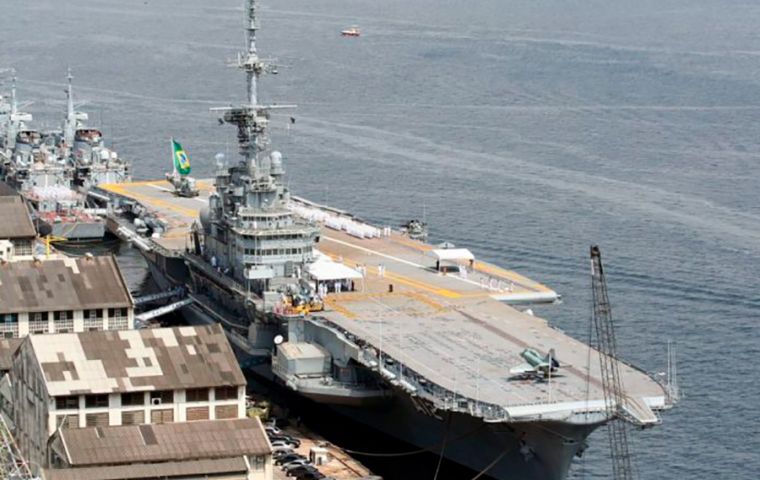MercoPress. South Atlantic News Agency
Turkey rejects scrapping Brazilian air carrier because of undeclared hazardous materials
 Environment Minister Murat Kurum said entry of the carrier into Turkish waters was suspended, conditioned upon a new hazardous materials inventory report.
Environment Minister Murat Kurum said entry of the carrier into Turkish waters was suspended, conditioned upon a new hazardous materials inventory report. The decommissioned Brazilian navy air carrier Sao Paulo, originally the Foch, a French Clemenceau-class carrier, built in the late 1950s and commissioned in 1963 is being towed back to Rio do Janeiro, unable to reach Turkey to be scrapped.
In 2000, it was sold to Brazil for €12 million, where it served as the flagship of the Marinha do Brasil with a flotilla of 22 A-4 Skyhawk fighters. In 2017, it was taken out of service, and decommissioned a year later. In 2021, the carrier was sold to the Turkish demolition yard SÖK Denizcilik.
Its journey began on August 4, 2022, when the aircraft carrier left Rio de Janeiro towed by the Dutch tugboat Alp Centre. However, on August 26, 2022, as the ship and its tugboat were off the Moroccan coast and preparing to enter the Mediterranean Sea through Gibraltar, the convoy came to a stop.
In an official statement, Turkish Minister of the Environment Murat Kurum explained that the entry of the aircraft carrier into the country’s waters was suspended, conditioned upon a new hazardous materials inventory report.
An initial report submitted by the Brazilian authorities was judged dubious, with major differences in the quantity of identified hazardous materials compared to ships of the same class and period.
For example, it estimated the presence of only 9.6 tons of asbestos when the Clemenceau, the Foch's sister ship, contained at least 600 tons of this cancerous material formerly used for fireproofing.
The survey did not detect PCBs, a material commonly used in insulation in the 1950s before being banned in the 1970s for being highly carcinogenic. There again, 165 tonnes of PCBs were found in the Clemenceau.
Finally, the NGO Ban Abestos France noted that the Foch was involved in securing the French atmospheric nuclear tests in the Pacific Ocean in the 1960s.
“The presence of 170 tonnes of lead/cadmium paint could retain radioactive contamination, as well as the lack of information on the prior removal of radioactive equipment, raise fears that the ship is contaminated despite claims to the contrary,” the NGO wrote in a statement.
Early on September 8, 2022, the Turkish member of parliament Ednan Arslan noted that the Alp Centre tugboat set its destination back to its port of departure. With the Sao Paulo now sailing back to Rio de Janeiro, its fate remains unclear.




Top Comments
Disclaimer & comment rulesCommenting for this story is now closed.
If you have a Facebook account, become a fan and comment on our Facebook Page!